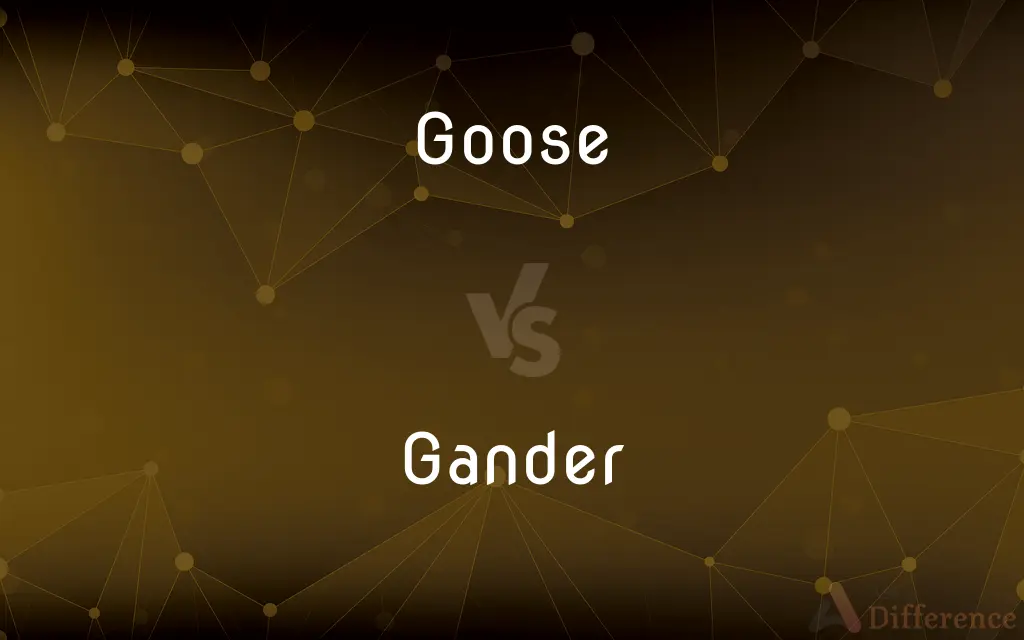Goose vs. Gander — What's the Difference?
By Tayyaba Rehman — Updated on September 18, 2023
Goose refers to a waterfowl species, and the term is often used to designate females. Gander specifically refers to a male goose. Both are similar in appearance, but ganders tend to be larger and may exhibit different behaviors.

Difference Between Goose and Gander
Table of Contents
ADVERTISEMENT
Key Differences
Goose is a general term for birds belonging to the waterfowl family Anatidae, particularly within the genus Anser and Branta. The word "goose" is most commonly used to refer to females, although it can also be used generically to describe both genders. Gander, on the other hand, is a term strictly employed to indicate a male goose.
Both geese and ganders are social birds that are often found in flocks. However, when it comes to nesting and raising offspring, the duties between a goose and a gander can differ. Typically, the goose lays the eggs and is primarily responsible for incubation. The gander often serves as a protector, guarding the nest and his family from predators.
From a grammatical standpoint, "goose" and "gander" are both nouns. However, "goose" has an irregular plural form: "geese." The plural of "gander" is regular and is simply "ganders." This plural formation is one of the elements that distinguish the two terms in English grammar.
In the realm of idiomatic expressions, both terms find their use but often in different contexts. Phrases like "What’s good for the goose is good for the gander" aim to emphasize fairness or equality, showcasing how both terms can be culturally significant despite their differences in gender and role.
Comparison Chart
Gender
Female or both genders
Male only
ADVERTISEMENT
Primary Role
Lays eggs, incubates
Protects, guards
Plural Form
Geese
Ganders
Idiomatic Usage
Various idioms
Fewer idioms
Typical Behavior
Social, nurturing
Social, protective
Compare with Definitions
Goose
Commonly refers to the female of the species.
The goose is sitting on her nest.
Gander
Refers specifically to a male goose.
The gander guarded the nest.
Goose
A goose (plural geese) is a bird of any of several waterfowl species in the family Anatidae. This group comprises the genera Anser (the grey geese and white geese) and Branta (the black geese).
Gander
Does not lay or incubate eggs.
The gander kept watch while the goose incubated the eggs.
Goose
A large waterbird with a long neck, short legs, webbed feet, and a short broad bill. Generally geese are larger than ducks and have longer necks and shorter bills.
Gander
Used in idiomatic expressions about fairness.
What's good for the goose is good for the gander.
Goose
A foolish person
‘Silly goose,’ he murmured fondly
Gander
Known for protective behavior.
The gander hissed at the approaching human.
Goose
A tailor's smoothing iron.
Gander
Larger than females in most species.
The gander was noticeably larger than the goose.
Goose
Poke (someone) in the bottom.
Gander
A town on the island of Newfoundland, on Lake Gander; population 9,951 (2006). Its airport served the first regular transatlantic flights during the Second World War.
Goose
Give (something) a boost; invigorate
The government's desire to goose the tired housing market
Gander
Look or glance at something
Paulie gandered at shelves full of coffee paraphernalia
Goose
Any of various wild or domesticated waterbirds of the family Anatidae, and especially of the genera Anser, Branta, and Chen, characteristically having a shorter neck than that of a swan and a shorter, more pointed bill than that of a duck.
Gander
A male goose.
Goose
The female of such a bird.
Gander
(Informal) A look or glance
"Everyone turns and takes a gander at the yokels" (Garrison Keillor).
Goose
The flesh of such a bird used as food.
Gander
(Informal) A simpleton; a ninny.
Goose
(Informal) A silly person.
Gander
A male goose.
Goose
Pl. goos·es A tailor's pressing iron with a long curved handle.
Gander
A fool, simpleton.
Goose
(Slang) A poke, prod, or pinch between or on the buttocks.
Gander
A glance, look.
Have a gander at what he’s written.
I took a gander and she seemed so familiar.
Goose
To poke, prod, or pinch (a person) between or on the buttocks.
Gander
(US) A man living apart from his wife.
Goose
To move to action; spur
Goosed the governor to sign the tax bill.
Gander
Ramble, wander
Goose
To give a spurt of fuel to (a car, for example); cause to accelerate quickly
"The pilot goosed his craft, powering away" (Nicholas Proffitt).
Gander
The male of any species of goose.
Goose
Any of various grazing waterfowl of the family Anatidae, which have feathers and webbed feet and are capable of flying, swimming, and walking on land, and which are bigger than ducks.
There is a flock of geese on the pond.
Gander
Mature male goose
Goose
A female goose (sense 1).
Goose
The flesh of the goose used as food.
Goose
A silly person.
Goose
(archaic) A tailor's iron, heated in live coals or embers, used to press fabrics.
Goose
A young woman or girlfriend.
Goose
An old English board game in which players moved counters along a board, earning a double move when they reached the picture of a goose.
Goose
To sharply poke or pinch the buttocks of (a person).
Goose
(transitive) To stimulate; to spur.
Goose
To gently accelerate (an automobile or machine), or give repeated small taps on the accelerator.
Goose
(UK slang) Of private-hire taxi drivers, to pick up a passenger who has not booked a cab. This is unauthorised under UK licensing conditions.
Goose
To hiss (a performer) off the stage.
Goose
Any large web-footen bird of the subfamily Anserinæ, and belonging to Anser, Branta, Chen, and several allied genera. See Anseres.
Goose
Any large bird of other related families, resembling the common goose.
Goose
A tailor's smoothing iron, so called from its handle, which resembles the neck of a goose.
Goose
A silly creature; a simpleton.
Goose
A game played with counters on a board divided into compartments, in some of which a goose was depicted.
The pictures placed for ornament and use,The twelve good rules, the royal game of goose.
Goose
Web-footed long-necked typically gregarious migratory aquatic birds usually larger and less aquatic than ducks
Goose
A man who is a stupid incompetent fool
Goose
Flesh of a goose (domestic or wild)
Goose
A waterfowl bird often found near water bodies.
The goose was swimming in the lake.
Goose
Can be used generically to refer to both male and female.
A flock of geese flew overhead.
Goose
Known for its migratory behavior.
The goose flew south for the winter.
Goose
Used in various idioms and expressions.
What's good for the goose is good for the gander.
Common Curiosities
How do you pluralize Goose?
The plural of goose is "geese."
How do you pluralize Gander?
The plural of gander is "ganders."
What is a Goose?
A goose is a bird in the waterfowl family, commonly referring to females.
What is a Gander?
A gander is a male goose.
Are both Goose and Gander social animals?
Yes, they are both social and often found in flocks.
What are some idioms using Gander?
"What’s good for the goose is good for the gander."
What is the main role of a Gander?
A gander often protects the nest and family.
Is Gander ever used to describe females?
No, it specifically refers to males.
Do Geese and Ganders look different?
They are similar in appearance, but ganders are often larger.
Can the term Goose refer to males?
It can be used generically but usually refers to females.
Do Ganders also migrate?
Yes, they migrate along with the geese.
What are some idioms using Goose?
"Cook someone's goose," "wild goose chase."
What is the main role of a Goose?
A goose typically lays and incubates eggs.
Do Geese migrate?
Yes, many species are migratory.
Are Geese or Ganders more aggressive?
Ganders are often more aggressive, especially when protecting their nest.
Share Your Discovery

Previous Comparison
Economic vs. Economical
Next Comparison
Column vs. BeamAuthor Spotlight
Written by
Tayyaba RehmanTayyaba Rehman is a distinguished writer, currently serving as a primary contributor to askdifference.com. As a researcher in semantics and etymology, Tayyaba's passion for the complexity of languages and their distinctions has found a perfect home on the platform. Tayyaba delves into the intricacies of language, distinguishing between commonly confused words and phrases, thereby providing clarity for readers worldwide.













































